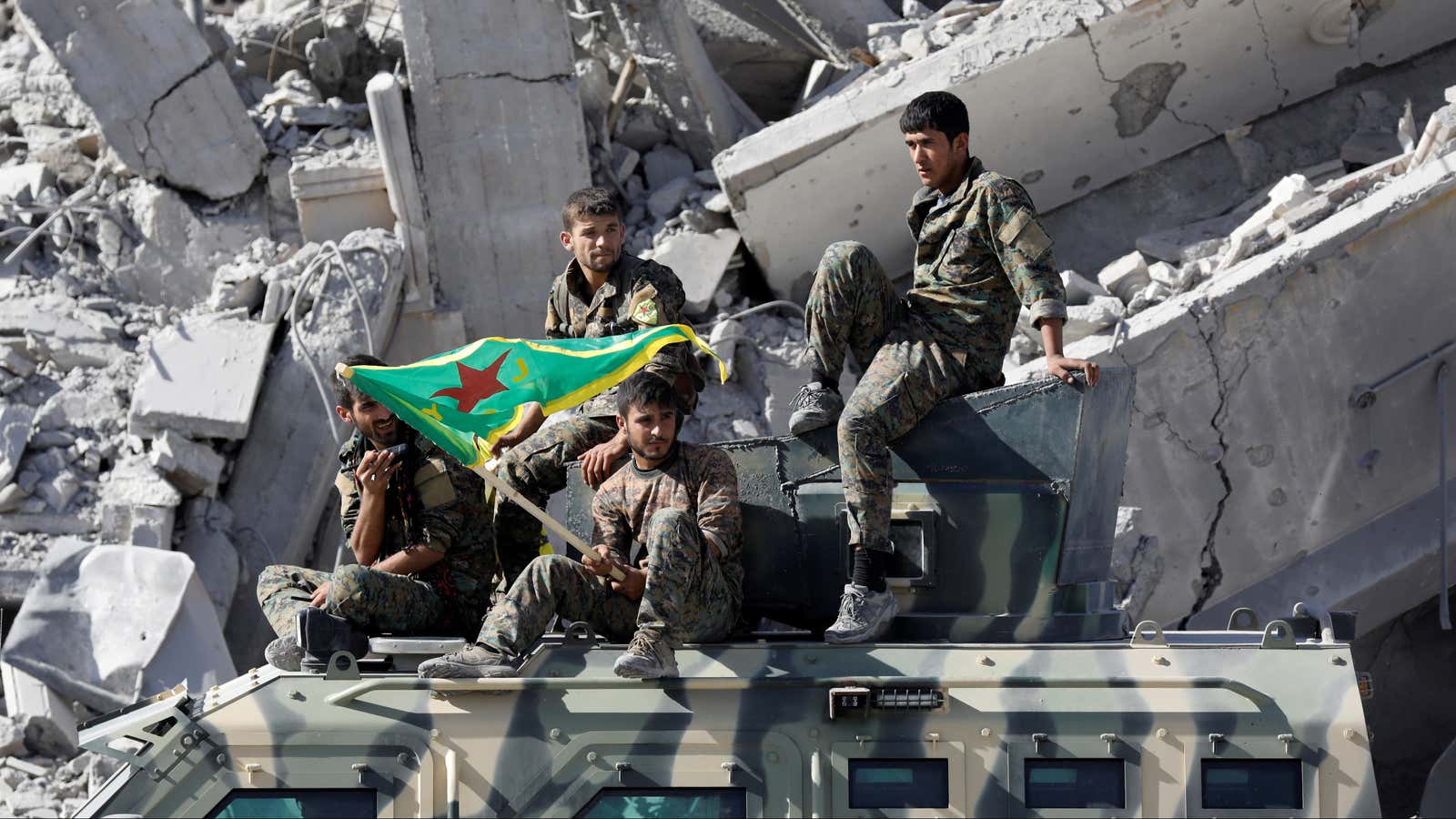After three years of ISIL reign, and an offensive that took nearly a year, Syrian Democratic Forces (SDF), the Kurdish-led independent militia that has systematically taken on the caliphate in Syria, freed the Syrian city of Raqqa. This is a key victory in the war against ISIL, which had chosen Raqqa as the headquarters from which, since early 2014, the terrorist organization ran its operations.
Raqqa, now free, is a skeleton of a city. Little has remained of what it once was—and ISIL leaves behind not just a destroyed city but a battered people that suffered years of abuse of the worst kind, with the violent imposition of a backward vision of Sharia-inspired law.
During its reign, ISIL fighters controlled the population, forcing obedience to a wide range of freedom-limiting regulations. Anyone found to break the caliphate’s decrees—on anything ranging from appropriate attire to entertainment—was punished. Flogging generally was the penalty of choice. For more serious crimes—or even the mere suspicion of violations—the organization would carry out beheadings.
Taking control of Raqqa does not equal annihilating ISIL—but it is the end of the caliphate as it has been conceived. The Islamic State will remain as a terror network, no longer controlling a territory. It is an important moment—one useful as a time to remember the horrifying measures endured by the residents of ISIL-occupied Syria and Iraq.
The punishment of women
During any war, women often pay the steepest price. And this has never been truer than during ISIL occupation: The regime used abuse of women and the complete annihilation of their freedom as a cornerstone of its ideology. In the past three years, misogyny has been the law of the land—and women have been punished for everything short of existing.
Women—in Raqqa, Mosul, and other ISIL-held territories—were progressively been forced to cover themselves completely, dressed head to toe in black niqabs (head and face cover) and abayas (a long coat), hiding even their hands and feet, and wearing a film of cloth covering on their eyes (paywall). Women’s stores have been forbidden from selling anything other than what would comply.
Women were banned from wearing perfume, donning bright accessories, even speaking loudly. They were advised not to leave their homes unless necessary, and forbidden from leaving the city without male relatives. A special all-female militia, the Khansa Brigade, was tasked with policing women who broke the rules of modesty: They’d be punished with flogging, often 40 lashes, for violating the dress code, inside or outside their homes.
Working with, or being in the presence of, a man who wasn’t a relative could send a woman to prison for up to three months, along with flogging. Marriages were performed without women being allowed to as much as see their future husbands alone; women were used and sold as sex slaves, with guidelines on what type of rape would be allowed, and when.
The maintenance of “virtue”
The imposition of a so-called virtuous behavior didn’t limit itself to women’s freedom. Men, too, had to follow a dress code, which required traditional long and non-fitted clothes, and unshaven faces. Smoking, drinking and listening to music were forbidden—and as was owning or using a mobile phone, or accessing the internet. Cursing was forbidden.
Failure to pray was punished, as was working during prayer time. Holy shrines and graves were forbidden, as was praying in them. The weekend was truncated to one day, Friday.
The imposition of religious education
ISIL replaced a number of school subjects with Islamic studies, leaving students with enormous knowledge gaps in a range of fields. Science, mathematics, art, and music were eliminated from curricula, as well as social studies, history, and philosophy—all subjects that ISIL considers likely to “inspire depravity.” Sports were, too, forbidden. The study of Islamic law was made compulsory and Arabic language was taught from medieval texts. Photos and drawings were removed from classrooms, as were teachings determined to not be consistent with the Quran or other Islamic texts.
The restrictions on daily life
Public gatherings without official permission were forbidden, and participants accused of conspiracy. Play was forbidden, except for children in parks.
